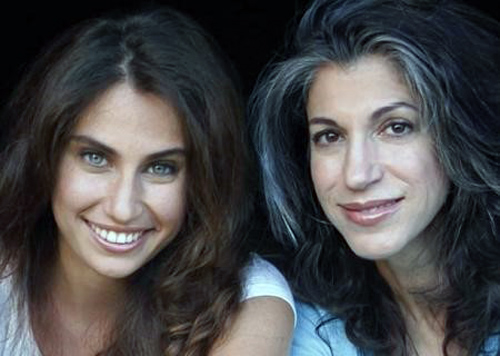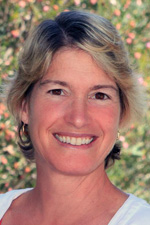
Have Mother, Will Travel by Claire and Mia Fontaine, William Morrow 2013, 978-0-06-168842-3, 309 pgs., paperback $14.99.
By Eva Trieger

SOLANA BEACH, California — Trolling through the stacks of my local branch of the San Diego County library, I was hungry for a good read over a break. I needed something to take me away from my ordinary machinations about school, learning disabilities and remediation. I happened upon a non-fiction memoir of a mother-daughter relationship that had come full circle. Have Mother, Will Travel is a beautiful and powerful expose of the evolution of two women who traversed a land mine filled path and found wholeness awaiting them at the end.
After reading their second collaborative book, laughing and crying along with them, I felt I knew Claire and Mia Fontaine. In fact, I wanted our conversation to continue, because they’d spoken directly to me. I found Claire online and we set up phone interviews
The first book, Come Back, set the stage for this second one. I had not read it, so when I spoke with Claire, I had to get some of the back story. Mia had been sexually abused as an infant, at the hands of her birth father. Claire fought him in court and won sole custody, eventually remarrying, and raising Mia with her new husband, Paul, the man Mia chose to recognize as her father.
Claire reported that Mia had been a model daughter, student, child until about the age of fifteen when she began using drugs, getting into punk rock, and chronically running away. Claire learned that this is not uncommon among children who are sexually abused at a pre-verbal age. After multiple attempts to bring her home, Claire and Paul found Morava, a school in the Czech Republic that provided a restrictive and therapeutic milieu. Following that experience, Mia was enrolled in another school in Montana, where she underwent extensive therapy and rehabilitation. Claire and Paul were also learning and growing during this tumultuous time.
I spoke first with Claire as Mia was traveling. I wanted to understand the technical side of co-writing a book such as this. Experiences are related first by one, and then the other, indicated by font style. This is a brilliant methodology, and with each page, the reader comes to know more about the ethos and personality of the narrators.
I asked both authors about the biggest hurdles in co-writing. Claire described their different body clocks and organizational approaches. As a mom, she learned painful things and wanted to write authentically without reliving all of the pain. A writer by trade, Claire is organized, focused. Mia related that she prefers to “vomit all my thoughts on paper and parse through them.” Each writer acknowledged there is value in both. Mia told me that she was most impressed with her mom’s discipline in her writing. She also told me that she was so grateful to learn about writing from her mother, and has inculcated many of these lessons.
I wanted to know what surprised both the women, what they learned from writing and traveling together. Claire stated “how often our minds would work alike.” Each writer wrote separately and then they would share their work. Mia accepted that her mom offered her a critique of her work, “not of me.”
Have Mother, Will Travel chronicles the duet’s trip to Europe. The writing is honest and open. It reveals a shift in the mother-daughter relationship to that of a woman to woman friendship. When I asked Mia and Claire what caused this shift, they both told me that open communication, active listening and mutual respect for each other’s privacy paved the way for deep trust and recognition.
Claire receives nachas when she sees Mia “blossom as a professional woman.” She is hugely proud of the choices Mia has made in creating the life she wants. The pair share a sense of humor, which both told me, is what has gotten them over the hurdles and through so many of the tribulations they’ve experienced.
While visiting Claire’s friends in France, Mia observed her mother in a new light. She saw her as a woman trying to find herself,” figuring out what she wants for Act 2 of her life. Adulthood has no endgame. Everyone is still trying to figure things out.” Mia expressed concern that America is too focused on youth, and there is little respect for the wisdom of aging women. This may be due to our country being hypersexualized, where the focus is less on allure or intellect. Mia explained that in Europe there is less emphasis on fleeting youth and beauty and more attention paid to the whole woman. This also plays a role on parenting.
Claire provided some great insight into the changing role of parenting an adult woman. She told me that the relationship never ends, “you’re a certain kind of mother until she’s 18, but you’re another kind of mother when she’s an adult. You’re expected to become a different kind of parent overnight, but there is no allowance for the transition.”
The dynamic partnership has a new agenda. They are looking forward to writing a book on child sexual abuse, and while it remains a sensitive uncomfortable topic, Claire’s research demonstrates how this abuse is linked to drug use, obesity, cancer and “garden variety misery.” Claire is eager to coach and mentor all women to become empowered and live authentically. She is working on seminars to disseminate this information and help others to remake themselves and leave the role of victim behind. These public speaking engagements can be located and arranged at http://www.claireandmia.com.
Something that Mia shared intrigued me, as I had never considered it. Any mother that would read her daughter’s diary is certainly breaking some unspoken ethical code. How dare she delve into the private realm of her little girl? Yet, a mother’s life is not allowed to hold any secrets or locked doors. It is almost a proprietary right that daughters feel they possess. This inequity had never before registered.
Mia agreed that most mothers and daughters run the gauntlet and experience a rite of passage from adolescence to adulthood, and she added that whether you want to admit it or not, your mom really does have insight about you that no one else can have. She acknowledged that the evolution doesn’t happen for everyone. Mia cited her own relationship with her grandmother. Bubbe is a Holocaust survivor and enjoys a different, less loaded, relationship with her granddaughter than she does with, her daughter, Claire.
The book resonated deeply within me as it entreated me to unlock a treasure box I keep cloistered in my heart. Though I did not experience Mia’s juggernaut, my mom and I had our own schisms before we came to a détente. Within my guarded safety deposit box, I hold the memories of our explorations as two adult women, adventuring in the world. Travels to Mexico, Israel, Stockholm and Romania cemented our bond, deepened our trust, and tickled our funny bones, just as observed with Claire and Mia. These two gifted authors prove that the mother-daughter bond is made of a magical substance that is at once malleable and eternal.
*
Trieger is a freelance writer specializing in coverage of the arts. She may be contacted via eva.trieger@sdjewishworld.com